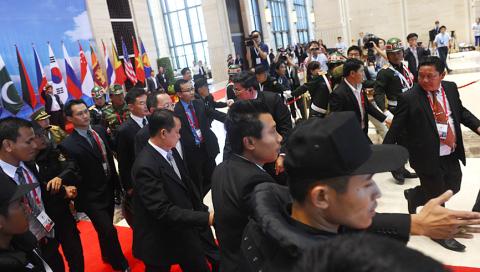Top envoys from China and North Korea held talks yesterday on the sidelines of an ASEAN summit in Laos as tensions run high on the Korean Peninsula over Pyongyang’s nuclear program.
North Korean Minister of Foreign Affairs Ri Yong-ho, a former nuclear negotiator for the state, and Chinese Minister of Foreign Affairs Wang Yi (王毅) met in the capital, Vientiane.
It is the first time Ri has attended a major diplomatic gathering since his appointment in May.

Photo: AFP
A phalanx of security guards from both Laos and North Korea guarded the room where the meeting was taking place.
Relations between Beijing and Pyongyang have frayed this year after North Korea’s fourth nuclear test and a series of missile launches put the region on edge.
In response to the new tests — the most recent of which was on Tuesday last week — Washington and Seoul announced plans to deploy a US missile defense system in South Korea, sparking fury in Pyongyang and concern in Beijing.
In the face of continued North Korean provocation, the US spearheaded the drafting of a new UN resolution adopted unanimously in March by Security Council members, including China — North Korea’s main diplomatic protector and economic benefactor.
Washington has since urged China to use its leverage over Pyongyang to implement tougher sanctions and push the reclusive state toward bankruptcy, but Beijing is wary of pushing the North too far, fearing a regime collapse that could create a refugee crisis on its border and swing the regional balance of power toward the US.
Last month, Chinese President Xi Jinping (習近平) stressed the importance of “friendly relations” with the North at a meeting with a top North Korean official.
North Korea formally withdrew in 2009 from six-party talks with South Korea, the US, Russia, China and Japan that were aimed at tackling the nuclear issue.
Beijing wants the talks revived, but Washington, Seoul and Tokyo all insist Pyongyang must first take some tangible step toward denuclearization.
Beijing previously acted as a buffer between Pyongyang and the other five members, using cash to lure North Korea back to the negotiating table.

The collapse of the Swiss Birch glacier serves as a chilling warning of the escalating dangers faced by communities worldwide living under the shadow of fragile ice, particularly in Asia, experts said. Footage of the collapse on Wednesday showed a huge cloud of ice and rubble hurtling down the mountainside into the hamlet of Blatten. Swiss Development Cooperation disaster risk reduction adviser Ali Neumann said that while the role of climate change in the case of Blatten “still needs to be investigated,” the wider impacts were clear on the cryosphere — the part of the world covered by frozen water. “Climate change and

Poland is set to hold a presidential runoff election today between two candidates offering starkly different visions for the country’s future. The winner would succeed Polish President Andrzej Duda, a conservative who is finishing his second and final term. The outcome would determine whether Poland embraces a nationalist populist trajectory or pivots more fully toward liberal, pro-European policies. An exit poll by Ipsos would be released when polls close today at 9pm local time, with a margin of error of plus or minus 2 percentage points. Final results are expected tomorrow. Whoever wins can be expected to either help or hinder the

DENIAL: Musk said that the ‘New York Times was lying their ass off,’ after it reported he used so much drugs that he developed bladder problems Elon Musk on Saturday denied a report that he used ketamine and other drugs extensively last year on the US presidential campaign trail. The New York Times on Friday reported that the billionaire adviser to US President Donald Trump used so much ketamine, a powerful anesthetic, that he developed bladder problems. The newspaper said the world’s richest person also took ecstasy and mushrooms, and traveled with a pill box last year, adding that it was not known whether Musk also took drugs while heading the so-called US Department of Government Efficiency (DOGE) after Trump took power in January. In a

It turns out that looming collision between our Milky Way and Andromeda galaxies might not happen after all. Astronomers on Monday said that the probability of the two spiral galaxies colliding is less than previously thought, with a 50-50 chance within the next 10 billion years. That is essentially a coin flip, but still better odds than previous estimates and farther out in time. “As it stands, proclamations of the impending demise of our galaxy seem greatly exaggerated,” the Finnish-led team wrote in a study appearing in Nature Astronomy. While good news for the Milky Way galaxy, the latest forecast might be moot